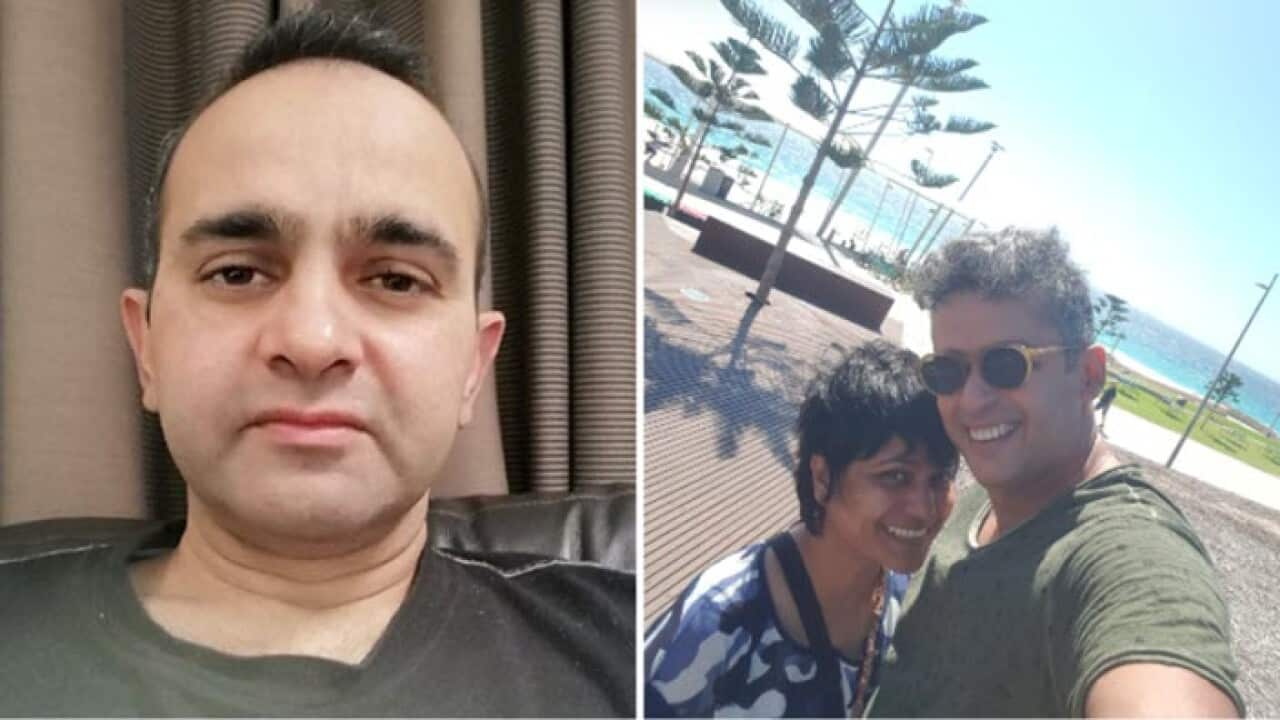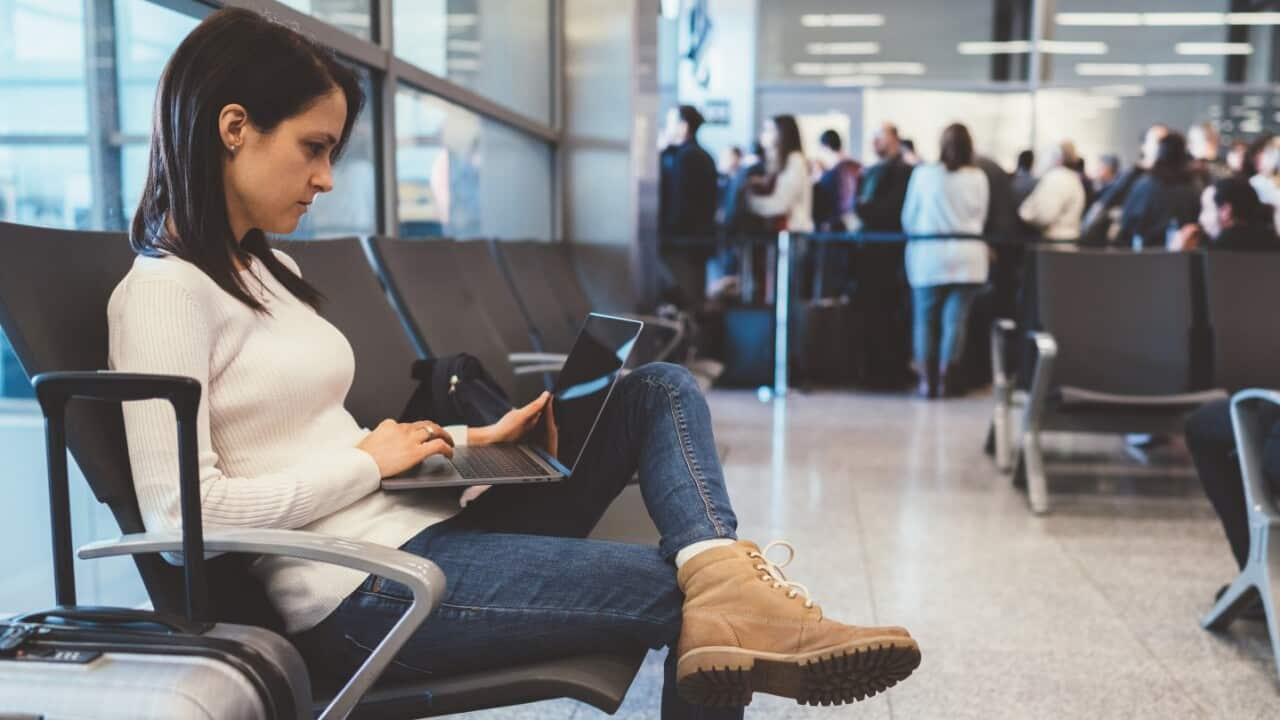Highlights
- Indian Australian community slams government's travel ban, labelling the restrictions ‘draconian and discriminatory'
- Community members fear the strict restrictions could prompt racism and stigma against Indian migrants
- Many suggest stricter and longer quarantine could be a 'better' long term solution
Many members of the community say they fear that the stricter restrictions could prompt racism and stigma against Indian migrants, calling the government to look for alternative ways to stem spread of COVID-19, claiming roughly 117 lives every hour in the South Asian country.
'Why only India?'
Melbourne-based Kashish had travelled to Kanpur in India’s northern state of Uttar Pradesh to tend to her ailing mother who had suffered a second deadly bout of throat cancer.
The 37-year-old engineer said her mum was responding well to the chemotherapy but her health took a nosedive when she tested positive for COVID. She succumbed to the virus four days after the diagnosis.
"I was heartbroken and decided it was best to return home to my husband and ten-year-old daughter in Melbourne. But two days after I got my tickets booked, the Australian government imposed a travel ban," Kashish said.
"Now I am stuck here all alone with no emotional support and I can feel it in my gut that this ban is not going to end on 15 May. At a time when the government should be working to fly back all their people from India, they have abandoned us," she added. Ms Kashish said her only question is why was India singled out?
Ms Kashish said her only question is why was India singled out?

The Indian travel ban also headed to court after an Australian launched a legal challenge against the restrictions. Source: EPA
“Why not the US and the UK also? The Morrison government had last week announced that other high-risk countries will also be identified, but which are those? Are people from the UK and US also being banned from returning home?” she said.
Adelaide-based Mandeep Sharma is stuck in Kapurthala, nearly 500 miles away from Ms Kashish’s parents’ house in Kanpur. The 43-year-old father of two had travelled to India on April 2 to conduct his father’s last rites. Mr Sharma said he initiated the process to apply for an outward exemption when his father was in the hospital, anticipating that he may be able to bid his final goodbye if he made it on time.
Mr Sharma said he initiated the process to apply for an outward exemption when his father was in the hospital, anticipating that he may be able to bid his final goodbye if he made it on time.

Mandeep Sharma remains stuck in India. Source: Supplied by Mr Sharma
But things didn’t move as swiftly as he wanted them to. It took him several days, many documents and three attempts to depart from Australia by which his father had breathed his last.
“I will forever endure this burden that I couldn’t make it home on time and left my mother all alone to conduct his funeral. We landed on 2 April by which my dad’s body had been cremated,” he said.
The distraught son is now eager to return to his wife and two daughters, but the Morrison government’s travel ban on returning travellers from COVID-stricken India means Mr Sharma has no way to return home until at least May 15, when the ban will be reviewed.
On May 1, the government further tightened restrictions when Federal Health Minister Greg Hunt made it a criminal offence for its own citizens and permanent residents stranded in India to enter the country. He announced that anyone failing to comply with the emergency determination under the Biosecurity Act could attract a $66,600 fine or a five-year jail term.
Calling it "discriminatory and draconian," Mr Sharma said when he first heard the news, he thought somebody had circulated a rumour.
Is this a joke? Don’t come home – is that the message you are sending to your own people?
“I know that some people and stakeholders are trying to weave a narrative that people were allowed to travel to India to get married or attend weddings. This is so not true. Most of the Aussies stranded here had compassionate and extremely compelling reasons to travel - in most cases that involved death in their immediate family,” Mr Sharma said.
‘Discriminatory and insensitive comments’
Others like Pankaj, a Perth-based businessman, told SBS Punjabi that he had to endure “vile and insensitive” comments from random strangers after his wife Kim, who remains stuck in Mumbai, criticised the travel restrictions in an interview on an Australian news channel. “Since our contact details are attached to my ABN, this random guy somehow messaged me on my phone and told me to ‘f##k off’ and that we [Pankaj and Kim] needed to get our priorities right,” Pankaj said.
“Since our contact details are attached to my ABN, this random guy somehow messaged me on my phone and told me to ‘f##k off’ and that we [Pankaj and Kim] needed to get our priorities right,” Pankaj said.

Pankaj and Kim; snapshot of the message he received. Source: Supplied by Pankaj
“He was disrespectful, insensitive, and discriminatory. Please understand that my wife travelled to India after her dad died of a sudden cardiac arrest. I too wanted to travel but didn’t get an exemption. People are ignorant and do not understand the trauma and circumstances many Indian Australians, and we are going through. Where is their empathy and compassion?”
The aforementioned stranger later apologised to Pankaj.
Government defends decision:
Prime Minister Scott Morrison and many other ministers of his Cabinet, including Education Minister Alan Tudge, came out in strong defence of the decision saying it was entirely based on health advice.
Mr Tudge on Monday said it’s only a temporary measure that will be re-looked at on 15 May and reiterated that clamping the borders shut is the primary approach that has kept Australia safe against the virus.
"About 15 per cent of our Howard Springs facility now has COVID in it, and nearly all of that has been from returning Indians in recent weeks,” he said.
What can be the long term solution?
Over 9,000 Australians in India registered as wanting to return home, 650 of them registered as vulnerable.
Dr Yadu Singh, president of the Federation of the Indian Association of New South Wales, said the government must justify the rationale behind implementing such strict measures. He argues that while the government’s immediate response to putting a ban was justifiable, making it illegal to return home and imposing a jail term or fine is disproportionate to the health crisis unfolding in India.
He argues that while the government’s immediate response to putting a ban was justifiable, making it illegal to return home and imposing a jail term or fine is disproportionate to the health crisis unfolding in India.

Dr Yadu Singh, President of the Federation of Indian Associations of NSW. Source: Dr Yadu Singh
“We are concerned with the rationale and timing of these strict restrictions. There are other ways to ensure the virus doesn’t come to Australia with the returned travellers, such as allocating a separate quarantine facility for returning travellers from India and increasing time in hotel quarantine,” he said.
Dr Singh said the government’s top priority should be to fly out those classed as vulnerable.
“It is entirely in the government’s capacity to repatriate its own people, ensure they have financial support and adequate medical supplies, including a provision to ensure they are all vaccinated while in India,” he suggested. But Michael Maher, the CEO and co-founder of e-wallet and electronic passport platform OnePassport, which digitises contact tracing to facilitate people visitor mobility, said Australia and countries around the world should send immediate medical assistance to the country instead of bringing back its own people.
But Michael Maher, the CEO and co-founder of e-wallet and electronic passport platform OnePassport, which digitises contact tracing to facilitate people visitor mobility, said Australia and countries around the world should send immediate medical assistance to the country instead of bringing back its own people.

Michael Maher, CEO, OnePassport Source: Supplied by Michael Maher
“India needs more immediate help, they need beds, they need oxygen, they need masks, so it's moving at such a pace, and with the government doing the next review on 15 May, I think the first thing is just building that immediate response to save people’s lives which is not about getting people on a plane and returning to Australia," he said.
The Melbourne-based entrepreneur added he hopes that people remember it's only a temporary measure, and when things will be under control, Australia would eventually reopen its borders with India, which accounts for the second-largest group of overseas-born residents In Australia as well as being a primary source of skilled migrants.
Click on the player above to listen to Mandeep Sharma's interview in Punjabi.
People in Australia must stay at least 1.5 meters away from others.
Testing for coronavirus is now widely available across Australia. If you are experiencing cold or flu symptoms, arrange a test by calling your doctor or contact the Coronavirus Health Information Hotline on 1800 020 080.
The federal government's coronavirus tracing app COVIDSafe is available for download from your phone's app store.
SBS is committed to informing Australia’s diverse communities about the latest COVID-19 developments.









